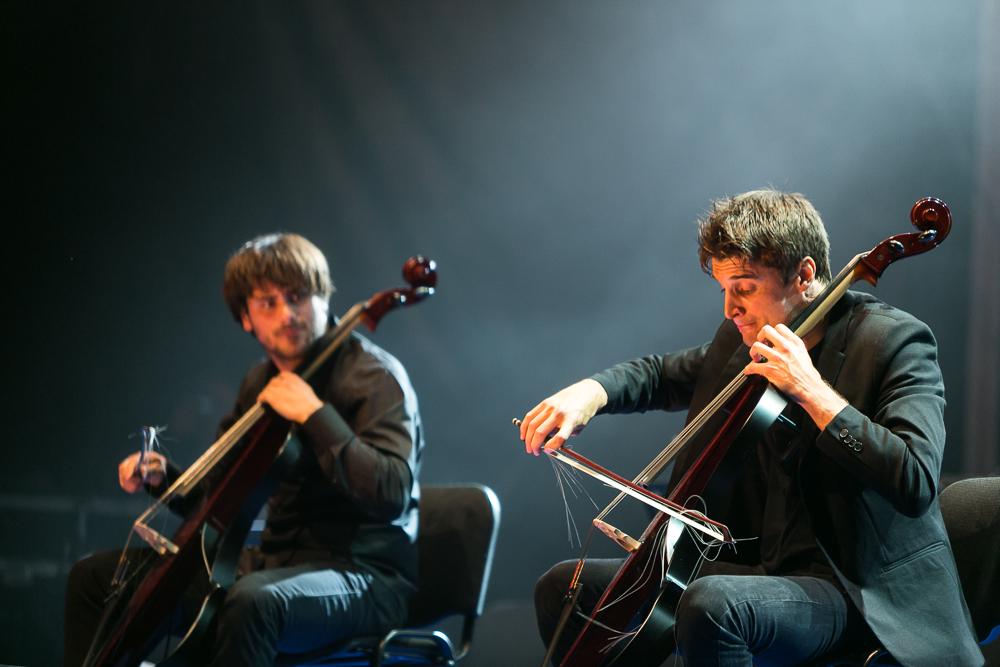

Luka Šulić, born in Maribor, and Stjepan Hauser, born in Pula, both come from musical families. They have known each other for a long time, since they met in competitions for young cellists. They soon realised that they were soul mates, since they share the same vision, energy and joy regarding cello and music. Under the name 2Cellos, they have produced exceptional videos and three albums, given numerous large concerts and gone on tours. Their fame skyrocketed after loading their first version of the song “Smooth Criminal” on the YouTube web portal years ago. And then a month later, they signed a contract with the Sony Masterworks record label, while Elton John invited them to join him on his world tour.
In 2011, they issued their debut album "2Cellos" that was placed on the Billboard most popular albums chart in the USA, became a number one on the iTunes portal in Germany and the highest selling foreign album in Japan. The CD brings a variety of adaptations, among which the first single of American rockers Guns N' Roses “Welcome to the Jungle” was the most noticed, whilst it further contains adaptations of other groups, such as Coldplay, U2 and Nirvana. In creating their second album Šulić and Hauser, who established their reputation in classical music circles before the success of their performances on YouTube, also had the participation of musicians like Elton John, Zucchero, Steve Vai, Lang Lang and Naya Rivera.
According to Šulić, they chose this particular instrument because the tonal colour is closest to the human voice, thereby making it the easiest instrument with which to express emotion. At concerts, they prefer to use electric cellos, since they sound much better in large venues, while also enabling more effects that the classical ones.
They are both very pleased with their success and do not wish to determine their creative work in the future. “Many options are open and we do not wish to limit ourselves. For certain, we are currently doing what we have always wanted to do and, for now, we will continue with it. We can play in churches as well as in stadiums; being on stage is the most beautiful feeling,” explained Hauser. They are both aware that they are not the only ones with adaptations of hits from classical music and believe that good luck and a set of coincidences contributed a lot to their success. “Previously, below-average musicians were choosing this path by making adaptations of classical music in a pop version. We are doing precisely the opposite, that is we select good pop and rock music and try to add a classical dimension to it by using cello and our emotions,” said Šulić.
As classical musicians, trained at renowned academies abroad, they believe that even popular music can be of good-quality: “A song by U2 can have an equal or even greater emotional effect than numerous classical compositions.” As described on the Ljubljana Festival website, Šulić and Hauser have lately been returning to their roots, which were already evident in their first album, "2Cellos" (2011), and are now deepening them. According to the cellists, the third album, which was released this year and follows the album "In2ition" from 2013, is so far the most advanced in terms of arrangement and production as well as in terms of execution and sound.
Among other things, they are nostalgically returning to Michael Jackson with an adaptation of his song "They Don't Care About Us” and to Sting with an adaptation of "Shape Of My Heart”. Again, as on their second album, they have provided a surprise – an original song "Celloverse” that flirts with dance rhythms.
Luka Šulić is the son of a Slovene mother from Izola and a Croatian father from Dubrovnik. He was born in Maribor in 1987 and then lived with his family in Dubrovnik. He completed his studies at the Royal Academy of Music in London. A year younger Stjepan Hauser was born in Pula and graduated from the Royal Northern College of Music in Manchester. He does not see any similarities in what they do with Vanessa Mae, who became famous overnight, but whose fame also vanished overnight. “We only use the cello as our voice and in our adaptations, we do not apply any “cheap” or, dare I say, unnecessary effects like techno beat, dance routines, a huge orchestra, brass section, etc.”
In his opinion, they have actually chosen a more difficult path. “To create such an intensity and energy, including that of the sound, on a cello alone is very, very demanding both in terms of music and technique. We are exploring the possibilities of playing the cello to the limits of what is possible, and thereby progressing by the day. We also had many achievements and concerts in classical music,” Šulić emphasised in conclusion.
Vesna Žarkovič, SINFO

































































